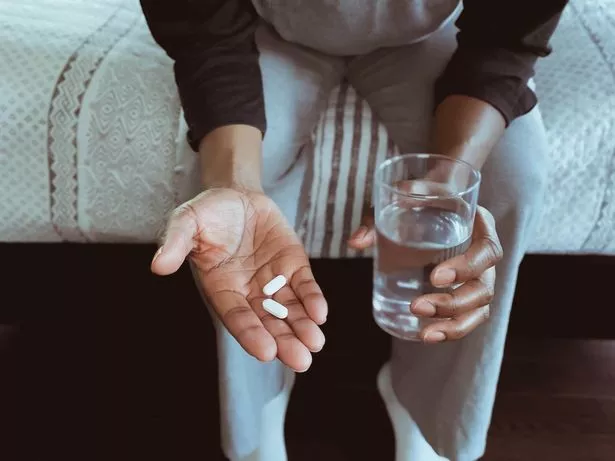If you, like millions of others, are on the common medication, then it would be wise to avoid this one type of tablet before speaking to your GP Speak to your doctor first if you’re considering taking the medicine, if you are already taking certain medication (Image: Alexandr Spatari/Getty)
Speak to your doctor first if you’re considering taking the medicine, if you are already taking certain medication (Image: Alexandr Spatari/Getty)
More than eight million people who take certain medication are being advised to avoid taking one type of pill, or risk it causing more harm than good. A leading pharmacist says people may be unwittingly putting their health at risk by combining hay fever tablets with everyday medication, including antidepressants, which millions in England are on.
Peter Thnoia, superintendent pharmacist at PillTime, is urging the public to check and double-check medication ingredients, as allergy remedy sales soar with the arrival of warmer weather. He warns that people taking sleeping tablets or tranquillisers, such as diazepam or zopiclone, face a heightened risk of developing breathing difficulties when these drugs are mixed with certain allergy treatments.
“Hay fever is hitting the country hard, but taking these sedating-style tablets is a no-go if you’re already taking medication to help you get to sleep”, says Peter. “Not only will they both combine to sedate you, but it can impact breathing and make you short of breath. It can also lead to dizziness and in extreme cases, people could even fall unconscious”.
The concern centres around first-generation antihistamines – the older type of hay fever medication commonly sold under brand names such as Piriton and Benadryl. These drugs are known for causing drowsiness, which can become dangerous when combined with other sedatives.
However, safer options are available. Peter says that non-drowsy antihistamines, such as loratadine, cetirizine, and fexofenadine, are widely available and generally safe to take alongside sleep aids or tranquillisers. “These are becoming increasingly common on shelves and are less likely to cross the blood-brain barrier, so shouldn’t cause the same sedative effects”, he adds.
 Many will take antihistamines to ease hayfever symptoms without realising the problems it may cause if they take certain medications alreadyPeople taking antidepressants warned of hayfever medicine
Many will take antihistamines to ease hayfever symptoms without realising the problems it may cause if they take certain medications alreadyPeople taking antidepressants warned of hayfever medicine
It isn’t just sleeping tablets that Peter says produce a harmful mix, either. He’s warned that certain antidepressants, when combined with drowsy hay fever tablets, can also create sedation issues – and in the most serious cases, can cause heart rhythm problems if taken over a long period of time.
According to the latest stats from the NHS Business Services Authority (NHSBSA), 8.7 million people in England were taking antidepressants as of 2023/24. The data released in the NHSBSA’s annual Medicines Used in Mental Health summary shows an increase of 2.1% compared to 2022/23. It is also estimated that 89 million antidepressant drug items were prescribed.
If you’re on antidepressants and thinking about using an antihistamine, it’s really important to talk to your doctor or pharmacist first. They can help you understand any possible interactions and figure out the best way to proceed.
Certain antidepressants can heighten the likelihood of experiencing side effects when taken alongside antihistamines, which may include issues like dry mouth or trouble urinating. The potential for interaction differs based on the specific antidepressant prescribed.
 Some antidepressants can interact with antihistamines
Some antidepressants can interact with antihistamines
Tricyclic antidepressants and MAOIs are especially prone to interacting with antihistamines. Additionally, various antihistamines have unique interaction characteristics; for instance, cetirizine should be used carefully with alcohol and other central nervous system depressants, including tricyclic antidepressants.
Peter says: “Tricyclic antidepressants – or TCAs, as they’re known – are like sleeping tablets in that they’re a powerful sedative, so anyone who takes them and then takes a drowsy hay fever tablet runs the risk of developing serious side effects. Both medications are anticholinergic too, so taking both means people could start to see other issues, like dry mouth, blurred vision and constipation.”
Even SSRIs , the most commonly prescribed class of antidepressants, such as sertraline, may carry similar risks, particularly when combined with older-generation antihistamines. “SSRIs are some of the most common antidepressants prescribed, so many people are surprised to see that they can react badly when combined with everyday tablets to tackle allergies,” he said.
“Each drug under the SSRI umbrella will have a sliding scale of side effects when it comes to drowsiness, but each one will have sedative properties, which is why it’s recommended that you go for a non-drowsy medication when suffering from hay fever.”
Common side effects of selective serotonin reuptake inhibitors (SSRIs) and serotonin-noradrenaline reuptake inhibitors (SNRIs):
- feeling agitated, shaky or anxious
- feeling and being sick
- indigestion and stomach aches
- diarrhoea or constipation
- loss of appetite
- dizziness
- not sleeping well (insomnia), or feeling very sleepy
- headaches
- loss of libido (reduced sex drive)
- difficulties achieving orgasm during sex or masturbation
- difficulties obtaining or maintaining an erection (erectile dysfunction)
Common side effects of Tricyclic antidepressants (TCAs):
- dry mouth
- slight blurring of vision
- constipation
- problems passing urine
- drowsiness
- dizziness
- weight gain
- excessive sweating (especially at night)
- heart rhythm problems (arrhythmia), such as noticeable palpitations or a fast heartbeat (tachycardia)
 Top tips for coping with hay feverWhat does the NHS say?
Top tips for coping with hay feverWhat does the NHS say?
The health service says: “Speak to a pharmacist or GP before taking antihistamines if you’re already taking other medicines. There may be a risk the medicines do not mix, which could stop either from working properly or increase the risk of side effects.” Examples of medicines that could cause problems if taken with antihistamines include some types of:
It adds: “Try not to drink alcohol while taking an antihistamine, particularly if it’s a type that makes you drowsy, as it can increase the chances of it making you feel sleepy. Food and other drinks do not affect most antihistamines, but check the leaflet that comes with your medicine to make sure.”
Hayfever and alcohol
Peter lastly warns that one of the most commonly mixed substances with antihistamines isn’t a medicine at all, but can have the same dangerous effect when combined. “Alcohol significantly amplifies the sedative effect of first-generation hay fever tablets, which can result in severe impairment and lead to unconsciousness or serious accidents,” he said.
“Even non-drowsy antihistamines can occasionally react with alcohol, depending on individual sensitivity.” He added: “So it’s best to avoid alcohol altogether if you’re thinking of allergy medication.”
It’s a good idea to check if your new medication interacts with specific foods or other medications to keep your health safe. If there are any interactions, don’t hesitate to ask if you need to change your diet or the way you take your other medications.
